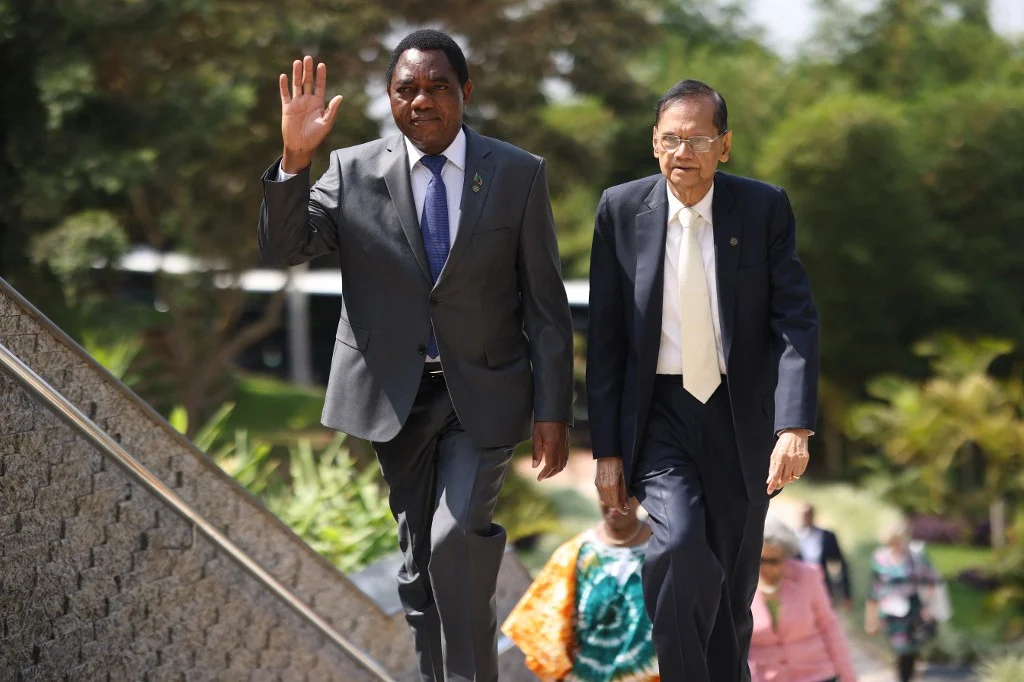On Wednesday, August 31, 2022, the International Monetary Fund (IMF) board finalised Zambia’s request for a US$1.3 billion Extended Credit Facility (ECF) spread over 38 months. This is an essential step in Zambia’s effort to revive its economy.
Zambia’s quota, or US$1.3 billion, or 978.2 million Special Drawing Rights (SDR), would be distributed, enabling the cash-strapped nation to restructure its debts, carry out critical economic reforms, and release funds for social expenditure and growth.
- The International Monetary Fund (IMF) board finalised Zambia’s request for a US$1.3 billion Extended Credit Facility (ECF) spread over 38 months
- Zambia, which had an external debt of US$17.37 billion at the end of 2021, US$5.78bn was owed to China, became the first African nation to default on its debt in the Covid-19 period in November 2020
- Zambia’s official creditors agreed in July 2022 to reduce the country’s debt, opening the door for the most recent bailout
The Executive Board of the IMF’s decision will allow an immediate disbursement of SDR 139.88 million, or roughly US$185 million.
According to the statement, Zambia is struggling with the legacy of years of economic mismanagement, with an unusually inefficient public investment drive.
The authorities’ programme, funded by the ECF arrangement, will progress the authorities’ domestic reform strategy to restore debt sustainability, provide fiscal space for crucial social spending, and strengthen economic governance.
The ECF-supported programme will promote economic governance, especially by enhancing public financial management and assisting in re-establishing sustainability through fiscal adjustment and debt restructuring, as well as by creating budgetary room for social spending to ease the burden of adjustment.
The programme will also help development partners provide much-needed financial support.
Zambia’s failure
As stated by the Fund, Zambia is in serious debt trouble. Its growth rates are too low to lower the country among the highest global poverty, inequality, and hunger rates.
Zambia, which had an external debt of US$17.37 billion at the end of 2021, US$5.78bn was owed to China, became the first African nation to default on its debt in the Covid-19 period in November 2020.
Following Zambia’s sovereign default, the G20 and the IMF’s managing director, Kristalina Georgieva group of creditor nations, established the Common Framework for debt solutions beyond the DSSI out of concern that a “debt tsunami” could engulf the continent’s most highly indebted countries.
Given that Chinese lenders own a sizable percentage of Zambia’s debt and that China is a non-member of the Paris Club, it was announced in early May that China and France would co-chair Zambia’s debt negotiations.
In a historic decision, Zambia’s official creditors agreed in July 2022 to reduce the country’s debt, opening the door for the most recent bailout.
Road to salvation
Since he won the election last year, Zambian President Hakainde Hichilema has worked to repair relations with the IMF following tense times under his predecessor Edgar Lungu.
Under Lungu, who came to office in 2015, Zambia’s economy borrowed significantly to fund infrastructure projects. His unfriendly regulatory environment in the mining sector and a default on its Eurobonds in December 2020 shook investor confidence.
President Hichilema expressed his support for the agreement in a series of tweets, claiming that it helps to handle the nation’s debt load.
Will the bailout resolve Zambia’s debt crisis?
The IMF’s managing director, Kristalina Georgieva, predicted that significant efforts would be required to assure the program’s success and that the G20 Common Framework would be essential to reestablishing debt sustainability.
A persistent fiscal adjustment will be necessary to restore fiscal sustainability. Adjustment plans put a proper emphasis on removing regressive fuel subsidies, improving the effectiveness of the agriculture subsidy programme, and cutting back on wasteful public expenditure.
The medium-term adjustment also needs to be supported by domestic revenue mobilisation. Zambia needs a comprehensive debt treatment under the G20 Common Framework in addition to the fiscal adjustment to restore debt sustainability.
To support the budgetary adjustment and address governance and corruption vulnerabilities, fiscal controls must be significantly strengthened.
It’s uncertain whether the bailout will help in the medium run until Zambia has a clear plan for recovering its economy, economist Hannah Ryder told African Business at the time of the first meeting.
“I am not convinced that much progress has been made; it all depends on the quality of how Zambia spends now, She said.
Zambia’s ministry of finance cancelled more than US$2 billion in commercial loan-financed projects in the weeks leading up to the meeting of Lusaka’s international creditors to prevent accruing more non-concessional debt.

